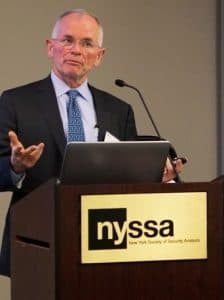On June 6th, CFA Society New York hosted Regulatory Changes: Impact on Financial Service and Energy Companies, two panels focused on changing regulations and how those changes affect the finance service and energy industries. Under the current proposed changes, it is essential that investors as well as other professionals within the investment management industry are made aware of how changing regulations impact their field and how they can profit from those changes. The panel was moderated by Nir Yarden, founder of Yarden Law Firm, LLC as well as the Chairman of CFA Society New York’s Regulation and Market Integrity Group, an initiative recently developed to analyze the impact of changing regulations on investments and firm operations. This panel featured, Bradley Ball who is the Financial Sector Analyst at UBS, Adam Gilbert, Partner and Global Regulatory Leader of the Financial Services Advisory Practice at PwC, Mark Menting, Partner at Sullivan and Cromwell LLP and Brian Golob, Principal at  Greenwich Associates
Greenwich Associates
Yarden opened the financial service panel by discussing the importance of the committee that he is chairman of and how pertinent it is to stay informed on regulatory changes for investors of all types. The discussion focused on questions about specific regulations and their impact on banks and asset managers, as well as where investors play a role throughout these changes. The first question that Yarden posed to the panel was focused on what effect regulation changes have on investment analysis as well as what investors should be looking out for. Bradley Ball responded by stating that as of right now, regulation can often be viewed as being on a pendulum, varying from very loose to very tight. As of 2008, the pendulum has been leaning towards tight which has in fact proven to be very beneficial to investors by downsizing the amount of risk. Looking forward, Ball states that investors are focused primarily on three things; the moderation of the cost of compliance, clarification around capital and liquidity requirements and oversight of capital return. Agreeing with Ball, Adam Gilbert added that another potential factor that investors should consider is that 27 out of 30 positions for the regulators responsible in part for creating and maintaining financial regulations, are currently to be appointed by the new administration.
Focused specifically on banks, Mark Menting states that the banking industry can be divided into three “buckets”. These buckets are different thresholds that banks reach based off the number of assets they have. The first bucket consists of banks with less than $10 million in assets, the second being banks between $10 million and $50 billion in assets and after crossing the $50 billion threshold, the bank enters the third bucket. These buckets allow a different perspective because reform changes with each level. Banks in the first level have significantly less regulations compared to the second bucket which are subject to examination and limitations, the third bucket being subject to the most impact from regulation changes. This perspective allowed for a change in conversation, to recognize that the regulation changes do not affect all investors the same way depending on which bank sectors they invest in.
Some very important regulation changes that were discussed in depth were the Durbin Amendment, which limits fees charged to retailers for debit card processes as well as the passage of ERISA which Brian Golob discusses in great length. Golob says that ERISA had a large impact on investment managers and provided many opportunities for growth but also for cost cutting. Golob states that to make transitions easier, it is important to understand the markets that you are trading in and that the most successful firms are those that have direct interactions with regulators.
The panelists then began to discuss which Dodd Frank areas are subject to potential rollbacks and some practical challenges that policy makers may face to implement those changes as well as other regulations such as the DOL’s new fiduciary rule.
In summary, the panelists concluded that as investors, it is important to stay aware of the constant changes in regulations, assess what impact those changes have on the companies followed and encouraged the attendees to attend more events hosted by this group.
About CFA Society New York
CFA Society New York—formerly known as CFA Society New York (CFANY)—is the local member society of CFA Institute, the global association of investment professionals that sets the standard for professional excellence and credentials. The organization is a champion for ethical behaviour in investment markets and a respected source of knowledge in the global financial community. The end goal: to create an environment where investors’ interests come first, markets function at their best, and economies grow. For more information, visit https://cfany.org.












